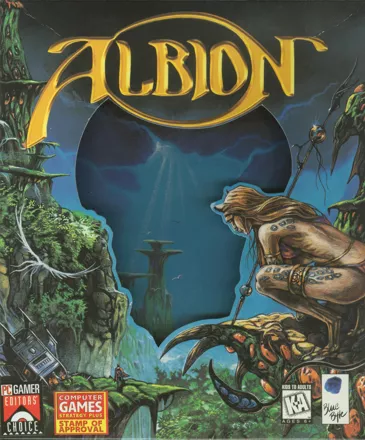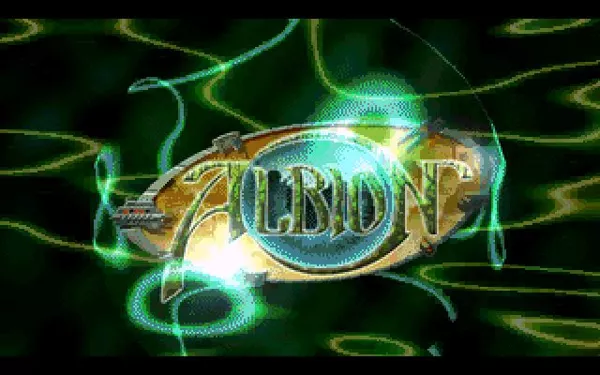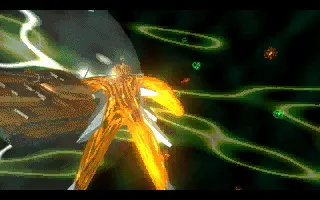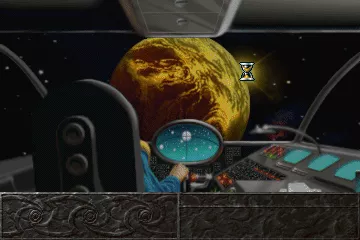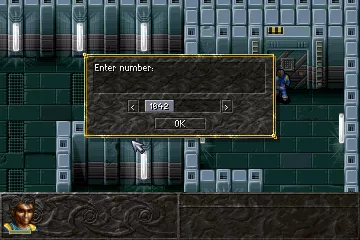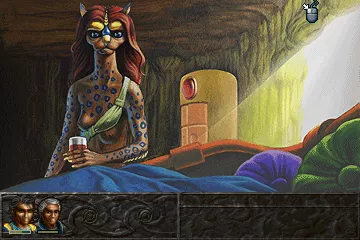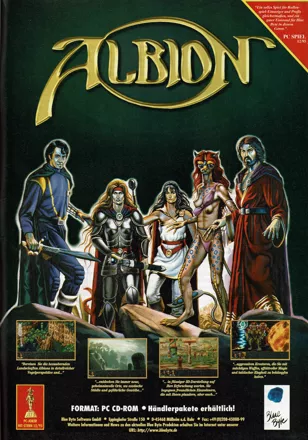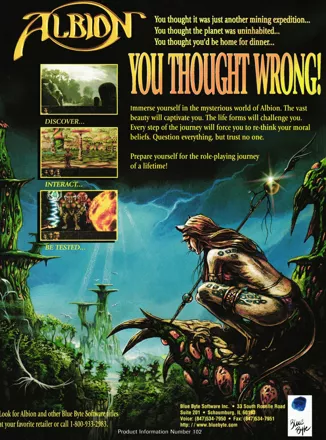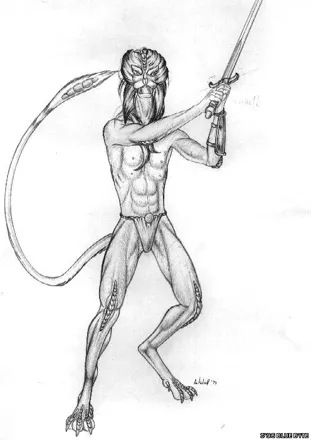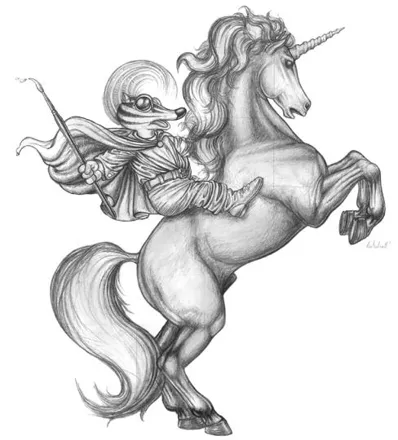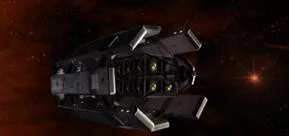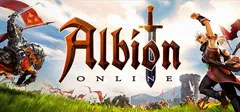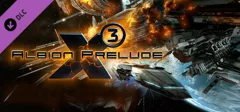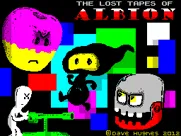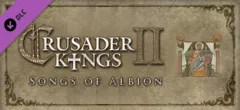Albion
Description official descriptions
The year is 2227. The powerful DDT Corporation has sent a factory ship called the Toronto to harvest minerals and resources from Albion, a newly discovered world which is supposedly barren of life but rich in resources. The space pilot Tom Driscoll is sent to take some atmospheric readings on the planet, but crash lands after an apparently accidental systems failure of his shuttle. Upon recovering from the accident he is shocked to discover that Albion is in fact a rich, life-filled world inhabited by various races with their unique cultures. It then becomes his task to explore the strange new world, helps its inhabitants, and eventually find his way back to Toronto.
Albion is a party-based role-playing game and a spiritual successor to Amber games. It features two principal exploration modes, 3D and 2D. The first-person 3D mode, similar to that of The Elder Scrolls: Arena, is used for most towns and all dungeons. The 2D mode takes place in the overworld, in smaller locations, and inside buildings, and uses a top-down perspective similar to Ultima VII: The Black Gate. Mouse or keyboard can be used to navigate the protagonists and interact with the environment.
The player controls a party of up to six characters in the game, all of which can be recruited in various locations in the game world and join the protagonist for plot-related reasons. Each character has his or her own unique fighting styles, abilities, and in some cases magic spells. Experience points are acquired by defeating enemies or solving puzzles; in addition, the player receives a set amount of training points that can be used to raise the characters' skills (such as close or ranged combat, magic, etc.). Enemies can be encountered in both 3D and 2D areas; a battle initiates when the protagonist comes into contact with an enemy. Combat is turn-based and takes place on a 2D 6x6 square grid. Topic-based dialogue system is used to obtain information about the game world, receive assignments, and advance the plot.
Groups +
Screenshots
Promos
Videos
Add Trailer or Gameplay Video +1 point
See any errors or missing info for this game?
You can submit a correction, contribute trivia, add to a game group, add a related site or alternate title.
Credits (DOS version)
36 People (19 developers, 17 thanks) · View all
| Producer | |
| Project Manager, Graphics, Scenarios | |
| Main Programmer | |
| Graphics | |
| Editor Maintenance and Scenarios | |
| Music and Sound Effects | |
| 3D Engine | |
| Combat Screen Effects | |
| Additional 3D Graphics, Combat Backgrounds, End Sequence |
|
| Intro | |
| Monster Graphics | |
| Manual Illustration and Pictures for Graphical Sequences | |
| Manual, Preparation of Graphical Sequences, Best Boy | |
| Philiosophical Coaching and Texts of the Cultures of the Kenget Kamulos and Dji Cantos | |
| Testing | |
| Installation Program | |
| Special Thanks (from the entire team) | |
| Erik wants to thank | |
| Jurie wants to thank | |
| [ full credits ] | |
Reviews
Critics
Average score: 77% (based on 21 ratings)
Players
Average score: 3.9 out of 5 (based on 60 ratings with 5 reviews)
Awesomely awesome game. Blue Byte pulled it off well...
The Good
It's great. The layout is creative for the battle, the exploring, the map. It's all good. The 3D "dungeon exploring" was great. Never boring. Few faults if any. The story and graphics put this game up there with some of Squaresoft's classics. I was surprised that such an un-advertised, un-popular game could be so much fun.
The Bad
I found it hard to heal my party. You can rest in lots of places but only if your party is tired and if you have rations. I found myself buying lots of rations because the enemies are so tough. It's rare to win a battle with all of your party members alive early on in the game.
The Bottom Line
Overall it's a great game. Blue Byte did amazing work with this one. One of my all time favorites.
DOS · by Dason Rise (17) · 2003
Great concept ruined by poor interface
The Good
The whole idea of the game is incredible! The story-line reminds me of a well-written episode of Star Trek:TNG. The characters are well thought out and the graphics are gorgeous for the time. The sounds and music are above average and fit well in the game's universe. The native Iskai race are very creatively brought to life.
Also, I found the combat system really well done. My preference is for turn-based combat, and Albion delivers well here. What I found odd though was how it switched back and forth between top-down and 3D perspectives. You choose your combat options in a 2D grid, then switch to first-person view to watch the battle unfold.
The Bad
Unfortunately for me, there were two issues with the game that made it difficult for me to continue playing the game after giving it about 10 hours of gameplay.
First, while I loved the initial 2D above-view perspective, when it switched to 3D first-person view in the cellar and cities, I found it extremely hard to navigate. The sense of "being there" (which is done so well in the Ultima Underworld games) is missing. For whatever reason, I could not tell perspective well in the 3D view -- I found myself turning into walls by misjudging corners, and I found myself turning completely around rather than making 90 degree turns. It just did not come across well for me. Everything was "flat" with no dimension. I personally would've preferred if the game kept the same 2D top-down perspective throughout the whole game, rather than switching between three different perspectives. Yes, there is a third perspective: in the outer world it's a top-down view from a much higher viewpoint (your characters appear much smaller onscreen). Additionally, it was confusing as to how they determined which parts of the game would be in each perspective.
Second, movement, whether in the 2D or 3D perspective, is handled by continually holding the left mouse button down. Other games that had similar type of movement (for example, Ultima VII) use the RIGHT mouse button instead. Personally, I found that holding the left button down continuously caused muscle fatigue and cramping beneath my index finger. This never happened in Ultima VII with the right mouse button and ring finger. This may have been a non-issue for me if they provided a good keyboard movement alternative. But they were very minimal in allowing only arrow key movement via keyboard. Since I had no comfortable way to move my party around through the game world, it was only a matter of time before I had to discontinue playing.
The Bottom Line
Albion is a role-playing game in a very well-written science fiction setting. It uses turn-based combat and three different views: a close-in 2D top-down perspective, a higher-up 2D top-down perspective, and a 3D first-person perspective. The game is very highly-rated and I can see why. The quality of the writing, graphics, music, and sound effects are all top notch. But for me, the interface weaknesses proved too hard to surmount and I had to discontinue play after about 10 hours. If these issues do not effect you, you may find this one of your best RPG experiences.
DOS · by himemsys (56) · 2017
The Good
It was a weird time in the realm of Western RPGs. Gold Box games were a thing of the past; the glory days of Ultima were over; the action path was heralded by its eighth installment, Ultima Underworld and Arena; Fallout didn't enlighten the RPG world yet; it was still a long time before Baldur's Gate made the extinct D&D cool again.
During this time, a modest German-made RPG named Albion went by almost unnoticed; it has gathered a small cult following, but could never achieve mainstream popularity. This is a great pity, because Albion is a remarkably rich and detailed game with plenty of RPG goodness to satisfy serious fans of the genre.
Albion is a true spiritual heir to Serpent Isle, which was probably the first large-scale Western RPG with a heavily scripted story and major input from party members. Albion further develops this somewhat "Japanese" trait; the colorful nature of the companions and the dramatic narrative betray the influence of Eastern RPG-making. But before you think Albion might be too "console-like" you should know that its gameplay is very "Western" as far as depth and exploration possibilities are concerned.
Basically, you follow a fairly linear story, but each location harbors plenty of things to do. Some areas are completely optional, and there is a wealth of interesting and well-hidden items, puzzles, and other points of interest. Albion is quite the opposite of Arena in its design philosophy: instead of giving you a huge randomized world it leads you into a much smaller, but meticulously detailed environment, where text descriptions and various small-scale events contribute to the individuality of each location. Everything is memorable because everything is done manually and with great care. There are obvious advantages and disadvantages to both approaches, but if you prefer characterization and personal involvement in your RPGs, Albion can get as satisfying as Serpent Isle and later games of the RPG Renaissance.
Above all, Albion is a labor of love. You can feel how every feature was carefully planned, crafted, and executed, how every little detail was taken into account. Albion unfolds slowly, but grants immense satisfaction to those who are willing to invest in it. It is an introvert game, with much more depth than brilliance, with seriousness and content instead of gimmicks and effects. Its designers were clearly concerned with the game's quality more than with its popularity; they may have sacrificed accessibility and user-friendliness, but never failed to be generous regarding gameplay wealth and world design.
Here is a simple example: Albion has an internal clock, with a day and night cycle. However, in the beginning of the game you are unable to tell the time. You can choose to venture into an optional location and retrieve an electronic clock, which will display the time on your screen. You can actually finish the game without ever finding that clock. This gives you an idea about how much attention this game pays to little gameplay features. Character management reflects this as well: characters can get tired and become physically weaker, unable to carry heavy objects; gold has weight in the game, so you can't just amass a huge amount of money and carry it around; you must bring rations and torches to illuminate your way in dark dungeons; Iskai (native race of Albion) characters have better eyesight, so if you make an Iskai the party leader, you will be able to see further in a 3D location; you must manually reload weapons that shoot projectiles; you can find broken items that can be repaired; you are able to pick up and store useless household items along with necessary equipment; and so on.
Albion has an interesting combat system, with simple turn-based mechanics (like in older or Japanese RPGs), but with limited manoeuvrability of characters on the battle screen. The system works surprisingly well once you get used to it. Combat is very challenging in the game, so strategic preparation (positioning characters on the field in rows) and tactical decisions (moving characters to gain the first melee attack, luring enemies, protecting a magic user in the back row, etc.) must be made in order to gain the upper hand.
It is hard to work your way through the complex world of Albion. But the satisfaction you get when things finally begin to function and you master combat nuances step-by-step is incomparable. The game offers plenty of hidden tricks which I personally love in RPGs: different ways to become stronger, optional locations with great spoils, and various paths to wealth. You can power-level characters, train with different people, exploit free gifts to gain a lot of money, trade items, and do many other things that make the whole experience very rewarding.
Albion also has a very interesting story with plenty of background information. Considerable parts of the game take place in the lush world of the Iskai race, which has its own unique culture and customs. It is enjoyable to just wander around and explore this exotic world, contemplating its flora, fauna, architecture and art of its inhabitants, etc. The game is also rich in text, with many descriptions for individual locations, and topic-based conversations with the people you encounter.
The Bad
The main problem of Albion is the fact it was released during a time when RPGs were not popular enough to have well-established traditions and templates. Nowadays every RPG belongs to some sort of design school; at that time, it was all about experimenting and trying out new ways. The developers of Albion enriched it with features taken from various games of the past, but some of these features don't really stick together that well. For example, the 3D dungeons, while detailed and interesting, are not very impressive graphically, and the navigation often becomes a pain due to slow rotation and confusing layout. The turn-based combat system is satisfying once you get used to it; but the tiny battle screen breaks the immersion of 3D dungeon exploration. The constant switches from 2D to 3D can get jarring. These visual inconsistencies probably contributed to the game's low popularity, even though they can be hardly considered serious flaws.
Albion is a demanding, challenging game that requires considerable patience to understand and enjoy. It doesn't allow you to breeze through it, but rather forces you to learn its mechanics and gradually advance towards the goal. The game's high difficulty level may have been another reason for its relative obscurity. Most battles can only be won by combined training, preparation, tactical skills, and often pure luck. The optional content is often vital to uncover, because the game simply becomes too hard otherwise. For example, very early in the game there is a completely optional area where you can find a gun; without having visited it, you'll be deprived of a powerful weapon that would make early battles much less frustrating.
The game maintains a serious, heavy tone throughout; it doesn't lighten up, and is for the most part humorless. The dialogues can be considered somewhat dry, especially compared to those of North American games, known for their liberal employment of jokes, puns, and anachronisms. Albion is in many ways a typically German game: it lacks American humor, Japanese charm, and French beauty, but it makes up for that with its remarkable thoroughness.
The Bottom Line
Albion is one of the most notable top underdogs of role-playing games. Created during a time of crisis, it managed to enrich the genre with its depth and attention to detail. It proves that even when RPGs were not mainstream, dedication and love to the genre were enough to produce a gem. No true RPG gourmet can allow himself to ignore this game.
DOS · by Unicorn Lynx (181775) · 2011
Trivia
Controversy
There was originally some objection to the game due to the cat-like Iskai having no taboo against running around in their birthday suits. An early in-game cut-scene shown when Tom awakes was a particular sticking point, showing the (female) village healer - bare-chested except for a backpack strap.
Inspiration
Lead Programmer Jurie Horneman about the game's inspiration:
Albion is not 100% copied from the Amiga RPG Ambermoon as claimed in another comment (which has since been deleted -- Ed.), but it is a sequel of sorts. We (the Albion team) were developing a sequel to Ambermoon when the company we were working for, Thalion Software, closed its doors. We subsequently moved to Blue Byte. The most logical choice was to do another game in the same style since we had the know-how. We started from scratch on the setting and storyline (which became a lot more coherent), but stuck to the same game format. Albion took two years to make. For various reasons it didn't become as popular as we would have liked, but in general the people who took the time to get into the game have enjoyed it. I still consider it to be the best game I've worked on.
References
There are some rather funny references at the beginning of the game, such as a character named "Inspector Snoopy Beagle" and "The Gates Peace Prize".
Additional information contributed by Dark-Star 1988 and Jurie Horneman
Analytics
Upgrade to MobyPro to view research rankings!
Related Sites +
-
Albion
Developer's game site. (archived)
Identifiers +
Contribute
Are you familiar with this game? Help document and preserve this entry in video game history! If your contribution is approved, you will earn points and be credited as a contributor.
Contributors to this Entry
Game added by Alan Chan.
Windows added by Evolyzer.
Additional contributors: Daniel Saner, Patrick Bregger.
Game added November 24, 1999. Last modified August 25, 2023.
